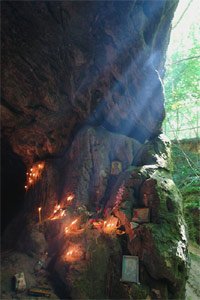The cult places located near Bulgarian villages have different names in Bulgarian folklore, including church, chapel, monastery, and obrok. Some of these places even today continue to draw the residents of the community for certain religious holidays and all-village feasts.

© Photo: archive
In this edition of Folkstudio on RB compiled by our editor Albena Bezovska, we will tell you more about the ritual practices performed at such places in the past.
But first let’s start with a folk song:
The place for religious ceremonies and spiritual rituals in the past was called in different ways. Usually this place was named a Christian saint, the Virgin Mary or Jesus Christ. On the feast day of the patron of the shrine, church or chapel as it is marked in the church calendar, all-village celebrations took place. Most often this cult place was within the village or near it. It was naturally protected by the branches of century-old tree. Sometimes it was located near a fountain or a well. According to scientists, many of these places are selected because the remains of pagan temples, tombs or earlier Christian churches were found there.
In some parts of Bulgaria, the word “obrok” is used to denote a holy stone or a huge pile of stones arranged in a semicircle. Elsewhere people have erected crosses as well as small chapels made of stone or wood. The whole surrounding area is considered sacred, not just the heaped stones or the building itself. The whole area around was holy. Tradition has it that the trees, rocks or water should be kept intact.
 The famous Bulgarian ethnographer Dimitar Marinov has studied and described in detail the holy ritual places in different villages of Bulgaria from the early twentieth century. He said the data he found refers to about 150 years ago – i.e. in his opinion they are a reliable source about the traditions and vocative practices around the mid-18th century.
The famous Bulgarian ethnographer Dimitar Marinov has studied and described in detail the holy ritual places in different villages of Bulgaria from the early twentieth century. He said the data he found refers to about 150 years ago – i.e. in his opinion they are a reliable source about the traditions and vocative practices around the mid-18th century.
He describes several types of "churches". Bulgarians believed that the arable land and the fields were patronized by good spirits. According to legend, these are the souls of the most righteous of their fellow villagers, members of the patriarchal community who have moved in the afterlife. In gratitude for their protection, the people used to organize feasts called again “obrok”. The celebrations devoted to the good guardian of the village were called fairs. On these holidays a sacrificial offering was made - usually a large animal which had been previously consecrated in a special ritual. The people who performed the rituals were one and the same. They were believed to possess extraordinary powers. They were sort of leaders of the whole mystery. Besides the ritual animal, later they consecrated the meal prepared from the meat and the festive table. This was followed by a ritual exchange of bread among the participants in the celebration. Usually, the first piece of the bread was given to older relatives, godmothers and godfathers, etc.
From the late 14th to the late 19th century (1878), Bulgaria was under the Ottoman domination. Many Orthodox churches were demolished and the newly constructed ones had to meet certain requirements. The people to whom Dimitar Marinov talked to collect information about the ancient vows say that "in olden times" priests attended the all-village feasts and served as elders of the community. But once the servants of God were not many and not every village had a priest. In these cases, the ritual foods and table were blessed with burning incense by the so-called elders.

© Photo: archive
In the entire ritual cycles, researchers see holy ancient cults to natural forces or patron saints. Whatever its roots might be, this unique form of Christian holidays has contributed greatly to the preservation of Orthodoxy in Bulgaria during the years of foreign domination. As to the etymology of the word "church", there are several theories in Bulgarian linguistics. According to some scholars, it has a non-Bulgarian origin but its interpretation of local traditions is deeply Bulgarian. Besides the denotation of temple, the word "church" in folklore thinking expresses the idea of unity, or of sharing that unites the community in honor of a saint. In the olden days, the vow did not include merriment. But the tradition of the great all-village horo chain dance has become a lasting presence in modern folk festivities.
English version Rossitsa Petcova
Clocks and bells will ring out in the center of Stara Zagora on Saturday, when the city will host the XXIV Masquerade Games Festival . The event will start with a traditional parade of participants. Attractive babugers, araps, old men and other..
Today marks the 88th anniversary of the birth of remarkable Bulgaria folk singer Nadka Karadzhova . Born on March 14, 1937 in the then Pazardzhik village of Trivoditsi (today - Plovdiv region), she is a descendant of an old musical family. At the age..
Every year, the chitalishte (community culture club) in the village of Kralevo not far from Targovishte, re-enacts Bulgarian traditions and rituals, organizing contests such as “Master lyutenitsa - maker” and “From granny’s dresser”. And for the..

+359 2 9336 661
